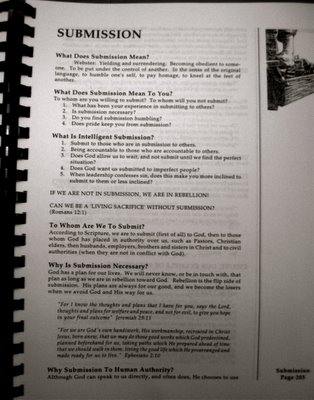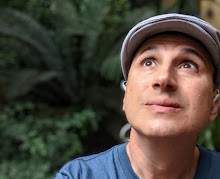Submission for Bondage Lovers
 While active in the conservative church, I learned lots about submission and accountability, a surveillance and monitoring system that rivals that of Homeland Security.
While active in the conservative church, I learned lots about submission and accountability, a surveillance and monitoring system that rivals that of Homeland Security.My pastor always kept an eye on his flock, not only for our welfare, but also to gauge our allegiance to him and his church. By being accountable to my pastor, I regularly informed him of my struggles, foibles, sins and doubts. He knew all my business.
At Love in Action (LIA) I learned that submission and accountability are the cornerstones for a successful "ex-gay" life. Each participant in the program was assigned a staff member to whom we privately confessed our daily sins--including masturbation. (When I first entered LIA, we admitted our masturbatory setbacks during the Tuesday night "Rules Rap", but this stimulated fellow participants leading to yet further masturbation.)
Since we had lived shady gay lives for so long, staff instructed us to be honest and bring our current struggles to the light during our accountability sessions. Initially I felt refreshed and relieved by the freedom of confession. Suddenly I had nothing to hide; I could bring my deepest most shameful secrets and desires to a trusted leader and receive compassion, support, advice--accountability.
Of course this leader had a leader over him to whom he reported not only his shortcomings but also all of mine. Ultimately, I learned that in the "ex-gay" movement, honesty is not the best policy. After two years of intensive dehomosexualization, I was expected to be better--less gay, less attracted to men, more in control of my urges. In some ways I was, but my carefully stitched together "ex-gay" existence barely held together no matter how much I trusted in the Lord and my spiritual leaders.
I confessed one sin too many, and I was ratted out. The chain of command issued a directive to cut me loose before I unraveled in front of everyone.
Many "ex-gay" leaders and workers, often the products of "ex-gay" programs themselves, live under this kind of constant surveillance. They carefully confess their sins one to another in an elaborate code, with the fear that the powers that be will one day find them out. Isolated in a climate of cover-up, surrounded by operatives who can turn them in, these "ex-gay" leaders fight the good fight desperate to share their struggles and questions, but terrified at the consequences.
With a word, they can be cast out of their positions, lose their most intimate relationships and their church membership only to then become prey to a gay media who often ruthlessly dives on the fallen then picks the "ex-gay" bones clean as they hold the fallen up to the spotlight.
Sometimes I think that "ex-gay" leaders must be the loneliest people on earth.


7 Comments:
Wow. This made me incredibly sad. Sad for folks caught up in this (who might not even realize, while in the middle of it, how sad it really is). But sad also for those of us who have lived this and are trying to come out the other side.
I think that honesty in relationships is good, and honesty about hopes, dreams, failures and so on is good with trusted friends, but there's something very different about the accountability/submission model as is played out in many ex-gay groups.
What you describe is almost Orwellian. In 1984 everyone lived in fear of being spotted. The risk came from the ever-present cameras, fellow travellers, internal spies, etc. You describe a same situation. Other clients could expose you. Your counselors ('outer party members') could report you to their superiors ('inner party') while still trying to protect their own interests and secrets. The overt goal leading you to love Christ (BB).
The end result though is a society fearful to express any independent thought or initiative--a society of automatons.
It sounds kind of like being under surveillance by the CIA or FBI, having someone watching your every action, and not being able and allowed to do things that you would ordinarily do on a regular basis. Freaky.
Wow, great stuff, in the post and in the comments.
I've long wondered, being no stranger to submission in the deviant/unGodly/perverted sense, why LiA would choose that word as one of their 'themes'. I guess I understand better now. Thanks, Peterson.
I can't help but frown at the kind of submission described here. Submission in the context of a sexual game is based on trust; trust that the person you're submitting to won't hurt you, will stop when you tell them to, and certainly won't rat you out!
This chain of submission and "accountability" (I knew there was something sinister about that word) seems based on a need to control rather than freely offered trust. The idea that the people living in this submission can be cut loose simply for failing is disturbing to me.
When you allow someone to submit to you you take on responsibility for them. You are supposed to take care of them, not drop them like a hot potato when the game doesn't play out the way you planned it. To cut someone loose when they are already made vulnerable because they have failed to lead up to their leader's expectations is so wrong, it's shocking.
I don't know much about God, but I can't believe a benevolent being would want that, or even want to put up with it.
Is that how God does things, too? If those who submitted to him don't do well enough, do they believe he just drops them?
Wait... that's it, isn't it? I guess they do believe that. How else could they do it themselves? So sad...
Bob P, in regards to "accountability" in my life, you are correct in part. I do meet once every 4-6 weeks with three members of my Quaker meeting. They form my support committee.
Bill and Bobbie are a heterosexual couple in their 70's with a gay son. John, is a 40 year old heterosexual man who does lots of peace activism. (I don't know why I'm giving you their "stats"; besides there is SO MUCH MORE to these folks than the labels I just used to describe them).
As part of Quaker process, people considering a "ministry" can ask for a clearness committee to help gather insight and clarity into the leading one feels. In the past three years I've had two different clearness committees to help me figure out what I should do with my Homo No Mo play and with the direction of my activism.
Once I determined that I needed to go full-time into the work that I do, I asked my meeting to help me form a support committee.
Their role is to support me (emotionally, spiritually and even in some ways practically) in the work I do. I submit a written report to them a few days before we meet to let them know how things are going, what is in the works and any issues I would like to discuss.
Unlike the accountability relationships I've had in the past, my support group has no agenda except to help me better understand my role in the world and to help me figure out what I need and how to get it. They ask me about my health, family, relationships, needs for when I travel, concerns, etc. They don't really offer advice; rather they are careful listeners who help me hear what is going on inside of me and around me.
Also, unlike other accountability I've had, there is no hierarchy. They do not "report" to anyone about our meetings. It is just a gathering of Friends who worship together and spend time focusing on my life and work. Really it is a very affirming supportive time. It helps me to not feel alone in the work I do as they give me an opportunity to process my performances, concerns and dreams.
***ALERT***
Ex-gay ATTACK. I need everyone's help over at Family Scholar's Blog start at post #188 ( November 21st, 2005 at 3:47 pm ).
Any assistance would be appreciated.
He was given an ultimatium after his last confession to staff about an area in which he struggled: fall again, and you will be kicked out of the program.
Let me ask a rhetorical question here: Does he get his money back then?
See...if they're about Helping people overcome their homosexuality, then where's the friggin' compassion when somebody 'falls' back into it? Where's the 'okay...let's pick them back up again, and get them back on track again' mentality? I mean...if somebody is still being open and honest about their struggles, and I was really about helping them, then I'd take that continuing openness and honesty as a sign they were still trying, and still wanted help.
Forgive my reflexes here...I haven't been through what most of you have...but this strikes me as just further evidence that they're really not about helping people to actually change, in the sense of changing desires, or even learning how to manage them. You can't impose this kind of Tell Us What We Want To Hear regimen on someone without knowing, at least at some level, that you're more concerned about the appearance of change, then actual change. Isn't it staringly obvious that you don't make people afraid to be honest with you, unless you really don't care if they're honest or not, so long as they keep up an appearance?
Now I am not saying here that there is anything wrong with being a homosexual, or being in love, body and soul with a same sex lover. I don't believe that. I reject the idea that there is any sin to same sex love, and I don't buy into any of the anti-gay rhetoric I hear from the ex-gay ministries. But doctors don't throw people out the door if they have a relapse. And preachers, actual men and women of the pulpit, don't turn their backs on the sinful, and especially not the ones asking for help.
So how do these groups do that? I don't think you can, unless you really don't care about all that. It isn't about loving God, it isn't about what's in your heart, it's not even about homosexuality, so much as it's about allegiance to the tribe. Are you with us, or against us?
Post a Comment
Subscribe to Post Comments [Atom]
<< Home